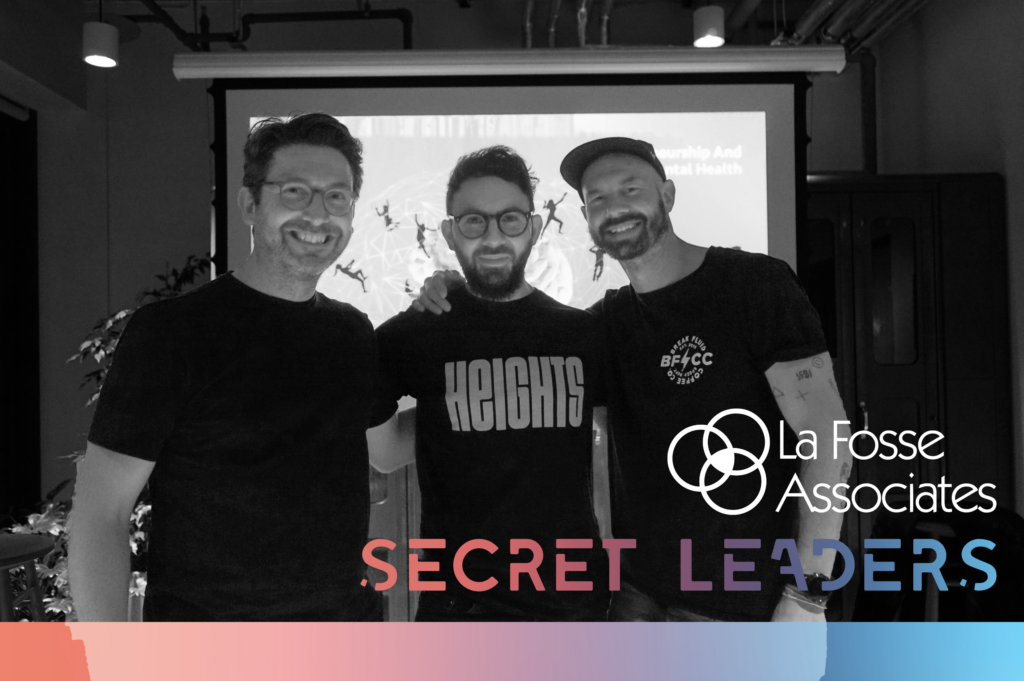The Royals are talking about it, the UK government is investing in it, and there’s a whole industry that is soaring because of it. But is the tech sector itself talking about mental health as much as it should be?
This was one of the key areas that was discussed during the latest Secret Leaders live audience podcast, which was recorded at WeWork, Spitalfields and sponsored by La Fosse. The event, which saw over 100 people from across the tech sector, aimed to lift the lid on what it means to suffer from mental health as an entrepreneur.
To discuss this, host Dan Murray-Serter, who himself has been open and honest about his mental health issues, was joined on stage by Damian Bradfield, co-founder of WeTransfer, and Matt “Mills” Miller, co-founder of UsTwo.
What followed was an honest, personal and equally inspirational 60 minutes of shared experiences, lessons learned and insights into how each of the three people on stage manage their own mental health.
To start, let’s take a look at some figures so as to put the debate into context.
How soon is now
Globally, there are 582 million entrepreneurs. Collectively, they make up 8 per cent of the workforce, yet when it comes to their mental health, founders are more susceptible to mental health issues than any other worker. Accordingly, entrepreneurs are twice as likely to suffer both depression and to have suicidal thoughts.
When we drill down even further and look at this on a sector basis, the figures make for starker reading. Indeed, an estimated 52 per cent of tech workers have experienced a mental health issue over the last 12 months, compared to the national average of 1 in 10 workers. This is being further compounded by the rapid rise in new tech entrepreneurs entering the market each year.
In 2018 for instance, 11,684 software development and programming companies started up in the UK. Of these, 1 in 3 are based in London – a city that has seen a 14 per cent in new tech start-ups year on year.
With more tech founders launching new products and services at a rate of knots, the need to prevent and tackle instances of mental health is more urgent than ever before. As Dan reminded us, Steve Jobs famously said: “The ones who are crazy enough to think they can change the world are the ones who do” – the operative word being ‘crazy’. If left unchecked, mental health could destabilise the foundations upon which many of these fast-growing tech businesses are based. So, what can be done about it?
Self-realisation
Mills opened up about how his dyslexia was a positive driving force for him. Since childhood, he said he had felt as though there was always a need to prove himself in spite of his condition.
When the app he developed (Monument Valley) surpassed the 40 million mark and the business he co-founded scaled to an incredible 400-strong workforce, he viewed this as the epitome of the success he had always been looking for. But that was when feelings of depression started to set in. It was the moment of Mills’ greatest success, so why was he experiencing such a low?
It is a similar story for Damian. Despite launching in 2009, it took a further six years before WeTransfer really made its mark. As with Mills, when the company was really taking off and achieving levels of success even he and his co-founders may not have though possible, Damian suddenly felt a similar low.
Living in Los Angeles, Damian described how his environment made seeing a therapist the norm. But when he walked back into the corporate environment, the opposite seemed to be the case. He explained that few people are truly honest about their mental health issues – the stigma is prevalent, and we need to find a way to talk about it. To do this, Damian argued, demands a change in the way we think about mental health. As he put it, “We all have bad days and we all have good days. Both make us who we are.”
For some, this may seem an uncomfortable truth. But it is one echoed by Mills. He asserted that as individuals the onus is on us all to better understand ourselves – especially if you are a founder. Mills recalled the times when he has had to make difficult decisions and let people go from the business who despite being personal friends who joined the company during its early days, weren’t necessarily right for where it is now and the direction it is heading.
In the same way, it is important to remove ‘toxic’ people who have the potential to spread negativity throughout the team. This is a stressful thing to do and can play heavily on the minds of founders, but it’s how you learn to cope with such anxieties that is important.
Damian agreed and added that a lot of the stress, anxiety and feelings of depression that he has experienced comes down to a perceived lack of control. One way he tackles this is by saying ‘hey, I’m struggling right now.’
That said, Damian was quick to point out that there remains a fear among a lot of companies that if you invite people to talk about their problems you open up the flood gates and ‘everyone’ will have a mental health issue. That’s certainly the European experience, he says, and much can be learned from the openness that exists Stateside.
It’s not all about you
Having self-awareness is one thing, but it also needs to be contextualised. Mills, for instance, shared a key aspect of his journey to better understand what was causing much of what he was feeling, and that the world – no matter what we might like to think – does not revolve around us. Things that happen to you, he said, might cause you anxiety but may not be that big a deal for someone else.
Damian took this a step further, by suggesting that the conversation taking place today in workplaces around mental health is being opened up to a wider audience compared to the closed debate of a decade ago. The tide, he said, is turning and people are more willing to talk about the challenges they face. While there is the argument that we have no control over social media, for instance, the way in which we manage the impact that this is having is very much in our domain.
Engaging the investor community
With the pressure among tech founders to launch and scale at pace, there is a debate over whether entrepreneurs should be honest about their mental health issues. Both Damian and Mills are clear on this point – be as honest as you possibly can.
Damian said that the investor community has evolved – there are a lot of VCs around today who really understand the issues that people are increasingly face. The focus, he suggested, is on demonstrating how what you have to offer is fundamentally a good business – one that is sustainable. But you also need to true to yourself.
Indeed, if you’re starting out on your entrepreneurial journey and already suffer from mental health issues, press pause. That doesn’t mean scrapping the idea of being a tech entrepreneur altogether, it just means park it for now and address the problem first – because running a business is very stressful, even when things go well, and you don’t want to needlessly add to that stress.
Mills supports this and as an investor himself, he was keen to remind everyone that ultimately, we’re all human beings and a potential investor may be able to help you to get through it.
The creative and business worlds are very different beasts. There are highs and lows common to both and it is important to have people around you who understand that. It’s OK to be low, to have a dip, even at times enjoy it. As Damian, Mills and Dan all agreed, as long as you recognise mental health for what it is then you can find that one thing which you can control.

Secret Leaders is a leading UK podcast, hosted by tech entrepreneurs Dan Murray-Serter and Richard Martell. They returned for season three following a hugely successful first and second series as one of the top Business Podcasts in the UK, exploring the stories & lives of the best leaders in Europe.
The first event (watch the highlights here) featured the founders of Shazam & Blippar who shared their insights into building world-class businesses.
Visit www.secretleaders.com for more information about the podcast, or subscribe with iTunes or Spotify. For more advice, insights, and intelligence, visit La Fosse Associates’ Executive Insights blog, or get in touch with Claudia.Cohen@lafosse.com.
Find out more about the industry-leading events we host for our clients and candidates throughout the year.
Found this blog interesting? You might also like:
